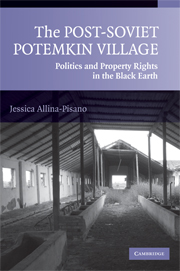Book contents
- Frontmatter
- Contents
- List of Maps, Illustrations, and Tables
- Acknowledgments
- Note on Transliteration
- Note on Sources and Methodology
- Glossary
- Two regions of the Black Earth, Voronezh and Kharkiv oblasti, 1991–present
- Voronezh oblast' in the twenty-first century
- Kharkiv oblast' in the twenty-first century
- The Post-Soviet Potemkin Village
- Introduction: Land Reform in Post-Communist Europe
- 1 Things Fall Apart
- 2 Keeping the Collectives
- 3 The Social Origins of Private Farmers
- 4 A Return to Regulation
- 5 The Politics of Payment
- 6 The Facade
- Conclusion: Rural Proletarians in the Potemkin Village
- Index
5 - The Politics of Payment
Published online by Cambridge University Press: 27 July 2009
- Frontmatter
- Contents
- List of Maps, Illustrations, and Tables
- Acknowledgments
- Note on Transliteration
- Note on Sources and Methodology
- Glossary
- Two regions of the Black Earth, Voronezh and Kharkiv oblasti, 1991–present
- Voronezh oblast' in the twenty-first century
- Kharkiv oblast' in the twenty-first century
- The Post-Soviet Potemkin Village
- Introduction: Land Reform in Post-Communist Europe
- 1 Things Fall Apart
- 2 Keeping the Collectives
- 3 The Social Origins of Private Farmers
- 4 A Return to Regulation
- 5 The Politics of Payment
- 6 The Facade
- Conclusion: Rural Proletarians in the Potemkin Village
- Index
Summary
After a decade of privatization, Black Earth villagers faced dwindling opportunities to gain access to the land that was rightfully theirs. In addition to the bureaucratic obstacles that stood in the way of land distribution, rural people faced a hostile economic environment and a local political landscape that prevented them from profiting from ownership. On most farms, labor payments and membership entitlements diminished over time, and ownership-based incentives were minimal. Amidst deepening poverty, villagers saw their chances ever of acquiring land or making a decent livelihood recede into the distance.
Farming land required start-up capital, and villagers had few ways to get it. Wegren et al. write, “While it was hardly the intent of market reforms to impoverish millions of rural Russians, this is exactly what has happened.” That the future held few prospects for most rural people became clear early in the process. In 1995, A. Rud'ko, a Kharkiv pensioner, expressed a common sentiment when he observed in a letter to the regional newspaper that “now, no honest villager can afford to buy land for himself, much less a combine or tractor. And without machinery, what can be grown today?” For most farms, amidst continuing political uncertainty, chances for capital investment from within or outside of the Black Earth countryside were slim.
Employment outside of reorganized collectives was scarce.
- Type
- Chapter
- Information
- The Post-Soviet Potemkin VillagePolitics and Property Rights in the Black Earth, pp. 139 - 165Publisher: Cambridge University PressPrint publication year: 2007

